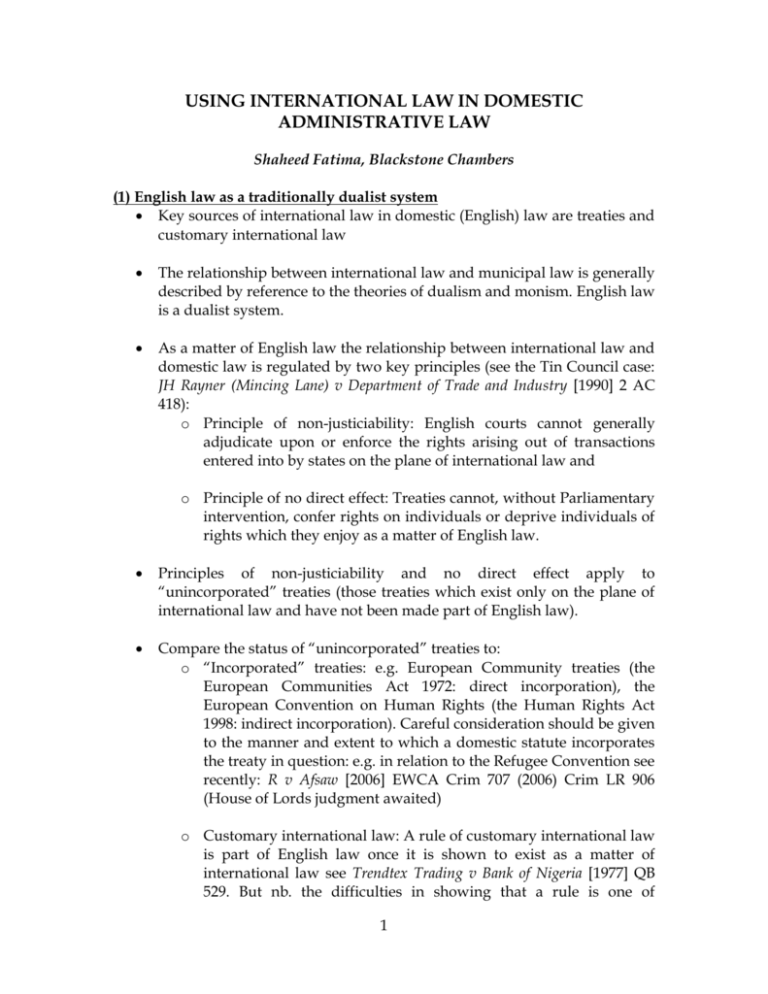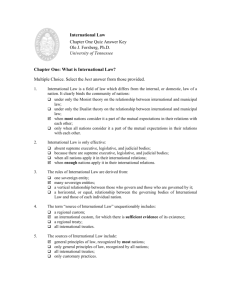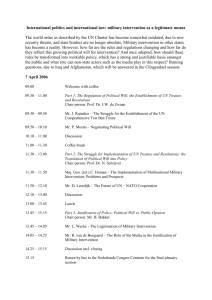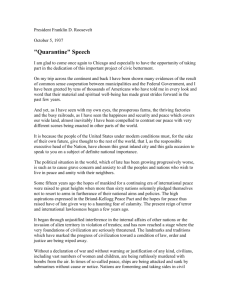Using International Law in Domestic Administrative Law
advertisement

USING INTERNATIONAL LAW IN DOMESTIC ADMINISTRATIVE LAW Shaheed Fatima, Blackstone Chambers (1) English law as a traditionally dualist system Key sources of international law in domestic (English) law are treaties and customary international law The relationship between international law and municipal law is generally described by reference to the theories of dualism and monism. English law is a dualist system. As a matter of English law the relationship between international law and domestic law is regulated by two key principles (see the Tin Council case: JH Rayner (Mincing Lane) v Department of Trade and Industry [1990] 2 AC 418): o Principle of non-justiciability: English courts cannot generally adjudicate upon or enforce the rights arising out of transactions entered into by states on the plane of international law and o Principle of no direct effect: Treaties cannot, without Parliamentary intervention, confer rights on individuals or deprive individuals of rights which they enjoy as a matter of English law. Principles of non-justiciability and no direct effect apply to “unincorporated” treaties (those treaties which exist only on the plane of international law and have not been made part of English law). Compare the status of “unincorporated” treaties to: o “Incorporated” treaties: e.g. European Community treaties (the European Communities Act 1972: direct incorporation), the European Convention on Human Rights (the Human Rights Act 1998: indirect incorporation). Careful consideration should be given to the manner and extent to which a domestic statute incorporates the treaty in question: e.g. in relation to the Refugee Convention see recently: R v Afsaw [2006] EWCA Crim 707 (2006) Crim LR 906 (House of Lords judgment awaited) o Customary international law: A rule of customary international law is part of English law once it is shown to exist as a matter of international law see Trendtex Trading v Bank of Nigeria [1977] QB 529. But nb. the difficulties in showing that a rule is one of 1 customary international law: see, e.g., R (Abbasi) v Secretary of State for the Foreign and Commonwealth Office [2002] EWCA Civ 1598 [2003] UKHRR 76. (2) Four ways of using international law in public law cases “Incorporated” treaties (see above) Customary international law (see above) “Unincorporated” treaties and the presumption of compatibility/principle of legality: o Ambiguous words in primary and secondary legislation should be construed so as to accord with the UK’s international law obligations on the basis that Parliament cannot have intended to legislate contrary to these obligations. The presumption is displaced where there is a clear Parliamentary intention to legislate contrary to the UK’s international law obligations. The presumption of compatibility does not require that statutorily conferred executive discretion be exercised in accordance with the UK’s international law obligations: R v Secretary of State for the Home Department, ex parte Brind [1991] 1 AC 696. Cf. R v Secretary of State for the Home Department, ex parte Venables [1998] AC 407. o The presumption of compatibility also applies to the common law – here the UK’s international law obligations guide the development of common law: see, e.g., R v G [2004] 1 AC 1034. o Closely related to the presumption of compatibility is the principle of legality: general words in primary and secondary legislation should be construed compatibly with fundamental (human) rights on the basis that Parliament cannot have intended, by using general words, to override such rights: see, e.g., R v Secretary of State for the Home Department, ex parte Simms [2000] 2 AC 115. Although the rights in question must already be part of domestic law their nature and scope may be affected by customary international law or by “unincorporated” treaties. Like the presumption of compatibility the principle of legality is displaced where there is a clear Parliamentary intention to legislate contrary to fundamental rights. “Unincorporated treaties” and executive acts: o Legitimate expectation: Conflicting authority exists as to whether the act of ratifying an “unincorporated” treaty can give rise to a 2 representation, by the executive, on which members of the public can rely as creating a legitimate expectation that future executive decision-making will be compatible with the “unincorporated” treaty obligations. See, most recently, the doubts expressed in R (ERRC) v Immigration Officer at Prague Airport [2004] QB 811. o Relevancy/error of law: Where unincorporated treaty obligations are voluntarily taken into account in exercising executive discretion that self-direction may be reviewed by courts: R v Secretary of State for the Home Department, ex parte Launder [1997] 1 WLR 839 (cf. Brind, above). (3) Future Developments? Increasing awareness will inspire an expanding and ever-more creative use of international law across a widening range of public law cases. Inroads will continue to be made into Brind. The ways in which international law informs and may be incorporated into European law will increase in relation to both o ECHR/HRA: R (Al-Jedda) v Secretary of State for Defence [2007] UKHL 58 [2008] 2 WLR 31 and o EU law: Kadi v Commission of the EC ((Case T-315/01), judgment of the ECJ awaited). ____________________________________ 3






